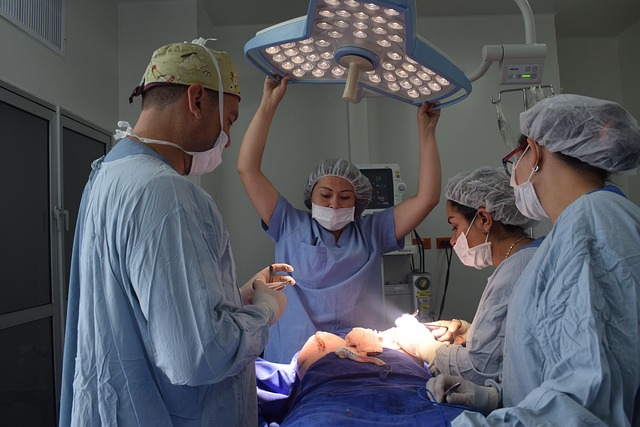Plastic surgery practices face unique risks from medical complications and patient dissatisfaction. Customized insurance plans beyond basic liability include malpractice, professional liability, and business interruption coverage addressing specific surgical concerns. Tailored policies protect against negligence, errors, financial losses due to equipment damage or legal issues, fostering trust and ensuring clinic continuity. Specialized plastic surgery practice insurance is vital for comprehensive protection, risk management, and maintaining a positive reputation in the competitive healthcare market.
In the realm of plastic surgery practices, specialized insurance is paramount to navigate unique risks and protect patient safety. This article delves into the essential aspects of custom insurance for cosmetic surgery clinics, exploring tailored coverage for surgical procedures. We uncover common gaps in standard plans and provide insights on managing claims effectively. Understanding these intricacies empowers surgeons and clinic owners to safeguard their practices, ensuring a robust risk management strategy tailored to the dynamic world of plastic surgery practice insurance.
- Understanding Insurance Needs for Cosmetic Surgeons
- Unique Risks of Plastic Surgery Practices
- Customizing Coverage for Surgical Procedures
- Protecting Patients and Clinics with Specialized Policies
- Common Gaps in Standard Insurance Plans
- Navigating Claims and Risk Management Strategies
Understanding Insurance Needs for Cosmetic Surgeons

In the realm of plastic surgery practices, understanding and securing the right insurance is paramount for several reasons. Cosmetic surgeons navigate a unique landscape where risks are multifaceted; from medical complications during procedures to patient dissatisfaction, each scenario demands comprehensive coverage. A tailored insurance plan for these clinics goes beyond basic medical liability, encompassing specific needs such as malpractice coverage, professional liability, and even business interruption insurance.
Given the highly specialized nature of plastic surgery, insurers offer customized policies that address unique concerns. Malpractice coverage protects against claims of negligence or injury during surgeries, while professional liability safeguards against errors in diagnosis or treatment plans. Business interruption insurance is also crucial, ensuring financial stability if a clinic faces temporary closure due to unforeseen events like legal issues or natural disasters. Such tailored insurance solutions enable plastic surgery practices to continue their services uninterrupted and maintain patient trust.
Unique Risks of Plastic Surgery Practices

Plastic surgery practices come with unique risks that set them apart from traditional healthcare facilities. One of the primary concerns is the potential for malpractice claims, as patients often undergo significant procedures with lifelong implications. These surgeries can lead to unexpected complications, such as infection, scarring, or asymmetry, which may result in patient dissatisfaction and legal repercussions.
Additionally, plastic surgery clinics deal with costly equipment and supplies, including advanced surgical tools, anaesthetics, and various cosmetic products. Property damage, theft, or loss of these assets could have substantial financial implications for the practice. Professional liability insurance is crucial to protect against lawsuits related to negligence, while property insurance ensures coverage for any physical losses or damages occurring within the clinic’s premises.
Customizing Coverage for Surgical Procedures

In the realm of plastic surgery practices, custom insurance plays a pivotal role in safeguarding both the clinic and its patients. Given the intricate nature of surgical procedures, tailored coverage is essential to address unique risks and potential liabilities. This includes comprehensive protection against complications arising from surgeries like breast augmentations, facelifts, or rhinoplasties.
Customizing plastic surgery practice insurance involves meticulous consideration of factors such as procedure-specific risks, patient demographics, and the clinic’s overall operational scope. Such customization ensures that the policy comprehensively covers medical malpractice claims, property damage, and even reputational harm resulting from adverse surgical outcomes. This proactive approach not only mitigates financial exposure but also fosters trust among patients, reassuring them that their well-being is a top priority.
Protecting Patients and Clinics with Specialized Policies

In the realm of cosmetic procedures, where outcomes are highly visible and patient expectations are high, specialized insurance for plastic surgery clinics plays a pivotal role in protecting both patients and practices. These tailored policies address unique risks associated with aesthetic treatments, ensuring that medical professionals can offer their services with peace of mind.
Customized coverage may include protection against malpractice claims, property damage, and even business interruption. For instance, a comprehensive policy could provide liability coverage for unexpected complications during surgeries, covering legal expenses and patient care. Additionally, it safeguards clinic assets, such as advanced equipment and facilities, from potential risks or disasters. This specialized insurance is a game-changer for plastic surgery practices, enabling them to focus on providing exceptional care while relying on robust protection measures.
Common Gaps in Standard Insurance Plans

Many cosmetic surgery clinics struggle with inadequate coverage provided by standard insurance plans. While general liability and professional liability insurances are essential, they often leave crucial gaps in protection for plastic surgery practices. One significant shortcoming is that typical policies may not adequately address the unique risks associated with aesthetic procedures, including potential complications, adverse reactions to anesthetics, or medical malpractice claims related to cosmetic enhancements.
Additionally, standard insurance plans frequently exclude coverage for high-value procedures like face lifts, breast augmentations, or complex reconstructive surgeries, leaving clinics with substantial financial exposure. These gaps can create significant challenges for practices, as they may be left to cover the costs of surgery revisions, legal fees, and patient care from their own resources if an unforeseen issue arises during a procedure. Customized insurance solutions tailored to plastic surgery practices are crucial in addressing these gaps and ensuring comprehensive protection.
Navigating Claims and Risk Management Strategies

Navigating claims and implementing robust risk management strategies are paramount for any successful plastic surgery practice insurance process. Cosmetic procedures, while life-enhancing, come with inherent risks that can lead to adverse outcomes, legal disputes, or patient dissatisfaction. Therefore, comprehensive insurance tailored to these concerns is essential.
Effective risk management involves staying updated on industry standards, implementing safety protocols, and providing adequate training for staff. Additionally, regular reviews of medical records, informed consent forms, and pre-and post-operative care plans can significantly reduce potential claims. By adopting these strategies, plastic surgery clinics can mitigate risks, ensure patient safety, and maintain a positive reputation in the competitive healthcare landscape.
